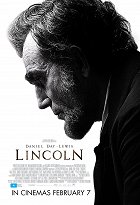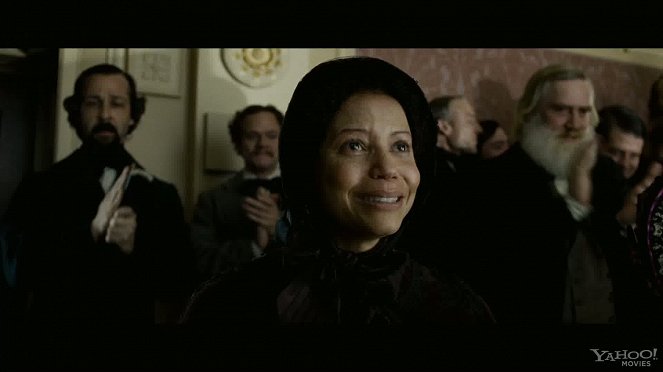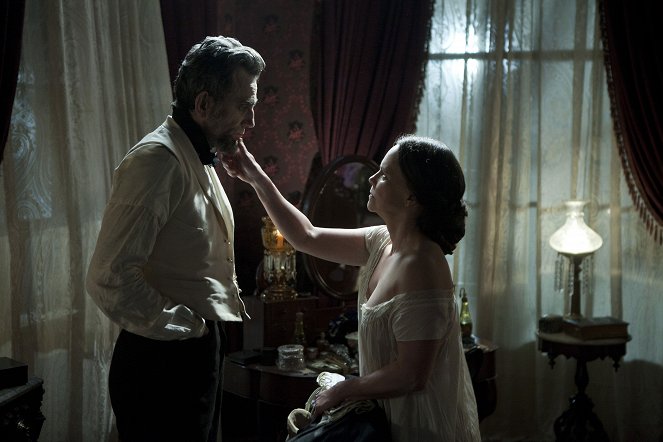Directed by:
Steven SpielbergScreenplay:
Tony KushnerCinematography:
Janusz KaminskiComposer:
John WilliamsCast:
Daniel Day-Lewis, Sally Field, Joseph Gordon-Levitt, Tommy Lee Jones, John Hawkes, Hal Holbrook, James Spader, Tim Blake Nelson, Bruce McGill, Joseph Cross (more)VOD (2)
Plots(1)
A revealing drama that focuses on the 16th President's tumultuous final months in office. In a nation divided by war and the strong winds of change, Lincoln pursues a course of action designed to end the war, unite the country and abolish slavery. With the moral courage and fierce determination to succeed, his choices during this critical moment will change the fate of generations to come. (20th Century Fox UK)
(more)Videos (56)
Reviews (14)
So what, guys, shall we abolish slavery? Yay or Nay? Lincoln watches broodingly. The lawmakers negotiate. Lincoln speaks broodingly. The lawmakers debate. Lincoln remains broodingly silent. The lawmakers argue. Lincoln dictates a letter, broodingly. The lawmakers vote. Lincoln broodingly leaves the room. The lawmakers celebrate. Lincoln dies, this time without a sign of broodiness. I’ll say this, for the target audience of historical conversational biopics (the film shows a battlefield only once, and right at the beginning), this film about the famous American president and the process of approval of the 13th constitutional amendment will probably be perfect. Spielberg is a master of his craft, Daniel Day-Lewis is a master of his art, and both of them show it. But honestly, who among us (with the exception perhaps of art scholars) can be interested in this? In short, a likely bland Oscar winner that I will not like. But I have to give it to it that it never pissed me off the way Spielberg’s previous film did. PS: And I looked forward all the time at least to the assassination… but nothing. PS2: Steven, please, do Robocalypse next.
()
In some ways, Lincoln uncomfortably reminded me of last year's sensational The Help. Probably due to the film’s ostentatious clinging to the fact that black and white, truth and falsehood have no shades. Spielberg made a film that reminded me of Eliad's concept of an absolute epic time. It is not a historical drama. It's a myth. A myth in which politicians disintegrate into enlightened progressivists, hysterical obscurantists and spineless "hesitators". A myth in which we do not ask what motivates the main character to such a determined attitude, what drives him forward, because the main character himself is the absolute truth (although it suggests a certain internal ruggedness in the film, the film never lets it prevail and disrupt the state aura). Lincoln could not have wished for a better form than Daniel Day Lewis imprinted on him - slow, deliberate, genial, infinitely kind, yet convinced and convincing to the bone. Spielberg treats the character with striking iconicity - the way he places him in the shots, the way he uses the meaning-creating light, only confirms to us that Lincoln the mortal is not in front of us, but rather Lincoln the icon. When the president dies, Steven draws a baroque shot in which life is darkness and death is light ("He has gone to Eternity"). The Hagiography of the Saint, including the structure of the narrative - an exposition revealing the world in imbalance / enlightenment through dream / rectification / martyrdom (something that has worked well since the Middle Ages, through messianism, to this day). I'm not making fun of it, I’m not questioning it. I've seen other deified lumens with a far greater degree of dilettantism, and it does not bother me in Lincoln. But it also doesn't affect me in any way. This is a film-ritual for believers, whether "Lincoln" or "Spielberg" lovers, who will compete in praising how narratively and formally brilliant it is (and it indeed is). I do not deny the film the visual captivation of classical art, nor the narrative prowess with which Spielberg brings humor to the leather framework of parliamentary debates and skillfully alternates spatial-temporal plans. But the film is cold, simplistic in some respects, avoiding real problems... I have to smile a little: when Lincoln bribes the Democrats to help him out, we can agree that he's doing the right thing (because he represents the truth, "it's a long time ago", and moreover it's filmed as a comedy). But when the protagonist of The Ides of March does the same thing, it's disgusting pragmatism, dirt, disgusting politics, and American critics are writing about a film that today's America doesn't need. Today's America certainly needs Lincoln and a solid granite myth. As a spectator, I don't need to see anything like this, even if it has a more self-virtuoso form. It is, in my view, self-affirming ideological boredom that defends any doubts by eradicating them with the schemes seen a hundred times, to which the elite actors' faces and the proven structure of the narrative give the impression of uniqueness. But such a film is not able to offer me anything important for life, just a yawning abyss of distance from the perfectly coherent and closed world of myth. With all due respect, Mr. Spielberg.
()
(less)
(more)
You are watching this historical borefest and keep thinking to yourself "where the hell did Spielberg's dynamism and fierceness in individual shots go, where’s the drive?". Lincoln is beautifully shot, solidly narrated with strong historical foundations, and Daniel Day-Lewis is once again captivating. However, films like this should be at least a little bit accessible to the audience, in other words, they must not be boring and tedious. Unfortunately, this was not the case here even in the slightest.
()
I had to force myself a little to look at Lincoln at all and I must say that it was worth watching. A myriad of great actors who have something to say... And Spielberg doesn’t make thoroughly bad movies at all and, although long-winded and boring, he makes the process of pushing through the 13th Amendment interesting. Abe (Daniel Day-Lewis is great and the Oscar nomination is more than justified) uses delay, corruption and twisting the truth to get his way. His kind and wonderfully pointed stories make him look like a nice guy, but because of this, the people have to suffer an extra month of war. A stellar moment in history they say... there’s nothing stellar about trying to get your own way and to succeed by scheming and half-truths. I should point out that during the final vote I had my fingers crossed that it would be passed and found myself with a wider and wider smile at each “Yay". Spielberg was successful in not presenting this period in history as being something ultra significant in creating history. He takes it raw, without emotion. And if it works, fine. And if not, at least they tried. Well it is a bit of a disadvantage that we know how it turns out. So it’s hard for the viewer to be fully satisfied. Excursions away from interiors (there are only a couple) where we see the war and what it involved (severed limbs in the wheelbarrow) take up just a couple of minutes of this lengthy movie. This is precisely the style (apart from the fact that the arguments have a head and tail to them) used when the Czech parliament sits (apart from the fact that in the movie someone is really sitting there and nobody is reading the newspaper or sleeping, in fact they actually speak and express their opinion) and I just can’t watch that for more than a few seconds. At least that Williams did the music, otherwise nothing special.
()
Not enough of Janusz Kamiński’s impressive exterior shots (two, to be exact: Joseph Gordon-Levitt watching body parts being covered with soil and the pair sitting on the porch). Too few emotional scenes in which John Williams could show off. Too few
relationship storylines that would increase interest in the characters and their fates. Too little of anything that would
intrigue viewers who are not interested in these particular historical events. Elegantly filmed and well-played interior
history tedium. Daniel Day-Lewis is excellent as always.
()


